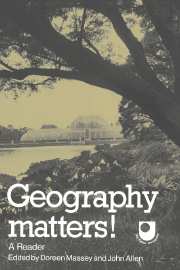Part 1 - Introduction: Geography matters
Published online by Cambridge University Press: 05 June 2012
Summary
Insofar as any sensible distinction can be made between the various social science disciplines, ‘human geography’ has traditionally been distinguished by its concern with three relationships. First, there is the relationship between the social and the spatial: between society and social processes on the one hand and the fact and form of the spatial organization of both of those things on the other. Second, there is the relationship between the social and the natural, between society and ‘the environment’. Third, there is a concern, which geography shares in particular with history, with the relationship between different elements – economy, social structure, politics, and so forth. While the ‘substance’ disciplines of the social sciences (economics, sociology, politics) tend to focus on particular parts of society, however difficult these are to distinguish and define, human geography's concern with ‘place’, with why different localities come to be as they are, has often led it to the study of how those different elements come together in particular spaces to form the complex mosaic which is the geography of society.
The way in which each of these relationships has been conceptualized has varied widely, and often quite dramatically, even in the recent history of the discipline. All have had their extreme versions. The most absolute of environmental determinists saw human character and social organization as a fairly direct and unmediated product of the physical (natural) environment.
- Type
- Chapter
- Information
- Geography Matters!A Reader, pp. 1 - 11Publisher: Cambridge University PressPrint publication year: 1984
- 42
- Cited by



